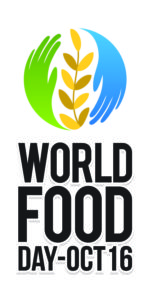 World Food Day, celebrated each year on October 16th, commemorates the founding of the Food & Agriculture Organization of the United Nations (FAO). In recent years, as general interest food, sustainability, and equity has risen, World Food Day has gone from being an obscure date on the UN’s calendar to an eventful day of worldwide awareness and action. It offers an opportunity to focus our attention on eliminating hunger and malnutrition around the world, today and for future generations. As we center on that challenge, we must also face up to the state of our climate, the depletion of natural resources needed to produce food, the complexity of global supply chains, and the opportunities for injustice within their long and tangled reaches.
World Food Day, celebrated each year on October 16th, commemorates the founding of the Food & Agriculture Organization of the United Nations (FAO). In recent years, as general interest food, sustainability, and equity has risen, World Food Day has gone from being an obscure date on the UN’s calendar to an eventful day of worldwide awareness and action. It offers an opportunity to focus our attention on eliminating hunger and malnutrition around the world, today and for future generations. As we center on that challenge, we must also face up to the state of our climate, the depletion of natural resources needed to produce food, the complexity of global supply chains, and the opportunities for injustice within their long and tangled reaches.
As food lawyers serving producers and entrepreneurs, we aim to help our food, beverage, and farm clients thrive. We do so by assisting them in understanding the law, managing risks, and protecting their business interests. Working with creative, visionary, and driven clients — most of whom want to bring nourishing, sustainable, and fair products to market — makes this work rewarding. As we manage the minutiae of drafting contracts, parsing regulations, and laboring over labels, the larger goals of supporting a just and equitable food system can feel a bit remote. But when we take a wide-angle perspective, it is easy to see that law, policy and even plain old compliance are powerful tools for promoting these goals.
According to the World Wildlife Fund, between 5 and 50 percent of the food on the market, depending on the globally traded food commodity, is not produced legally when assessed under the laws of its country of origin. Dr. Jason Clay, Executive Director of the Markets Institute at the World Wildlife Fund has identified five main sources of illegality in food production: (1) access to the resources, (2) labor rights, (3) fraud, (4) corruption and (5) other regulatory violations (i.e., unlawful deforestation, abuse of riparian zones, and misuse of agrichemicals). Whatever the causes, Dr. Clay warns that “illegally produced commodities pose risks to all stakeholders, including governments, traders, retailers, brands and consumers.” Whether the illegality takes the form of a food fraud and misbranding, over-fishing of threatened species, agrichemical pollution, or the exploitation of workers with little bargaining power, these harms move us further from, rather than closer to, the kind of food system we and our clients want to participate in. On top of the more direct and immediate harms, illegality and unfairness in the food system also poses collective risk and carries with it the potential for brand-tarnishing reputational damage. It can be helpful to remember that the law is, first and foremost, a tool for promoting fairness. Compliance, though sometimes burdensome, is how all actors in the system do their part to deal fairly.
Of course, following the letter of the law alone isn’t always sufficient to prevent harm to the planet or to ensure fair treatment of people and animals. Often our laws weren’t designed to address the kinds of ills or promote the kinds social and environmental goods many of would like to see. Social entrepreneurs and aligned non-profits can take cutting-edge, solutions-oriented steps to combat the most pervasive injustices in the food system. Participation in voluntary agreements, values-chain sourcing, third party certifications, and the promotion of genuine transparency in food can go a long way towards creating a positive impact. For that reason, we also take great pleasure in helping our clients to affirm and promote the values behind their products. Likewise, we are passionate about coming up with innovative ways to help our clients structure and share value within their businesses and create contractual relationships that fairly allocate risk and benefits.
In recognition of World Food Day, the attorneys at Handel Food Law recommit ourselves to using food law as a tool to help you do well by doing good food.
